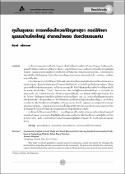บทคัดย่อ
การศึกษาปรากฏการณ์การเคลื่อนไหวในชุมชน เพื่อปรับเปลี่ยนประเพณีการบริโภคสุราในชุมชน โดยศึกษาทุนในชุมชนที่ทำให้เกิดการเคลื่อนไหวแก้ปัญหาการดื่มสุรา แสดงให้เห็นกระบวนการเคลื่อนไหวปรับเปลี่ยนประเพณีปฏิบัติในชุมชน และผลกระทบของปฏิบัติการการเคลื่อนไหวแก้ไขปัญหาสุราในชุมชนของอำเภอน้ำพอง จังหวัดขอนแก่น โดยอาศัยวิธีการวิจัยเชิงคุณภาพ ด้วยการเก็บรวบรวมข้อมูลภาคสนามจากการสัมภาษณ์เจาะลึก การสังเกต และศึกษาเอกสารที่เกี่ยวข้อง
จากการศึกษาพบว่าสุราในวิถีชีวิตและประเพณีของชาวบ้านเปลี่ยนแปลงไปพร้อมกับการเปลี่ยนแปลงของอำนาจและทุนในชุมชน ซึ่งคนส่วนใหญ่มองการบริโภคสุราว่าเป็นเรื่องปรกติ กว่าจะรับรู้ว่าสุราคือต้นเหตุของปัญหา ก็มีเหตุรุนแรงเกิดขึ้นในกลุ่มวัยรุ่นและชุมชน จนไม่สามารถควบคุมได้ จึงทำให้ชุมชนลุกขึ้นมาเคลื่อนไหวแก้ปัญหาด้วยวิถีประชาคมชาวบ้านด้วยวิธีการ “โสเหร่” โดยการนำของ เจ้าอาวาสวัดผู้สั่งสมบารมีจนเกิดเป็นทุน 3 ประเภทคือ (1) พลังความเชื่อและแรงศรัทธาในศาสนา เป็นวัฒนธรรมชุมชนที่เข้มแข็ง (2) สัมพันธภาพที่ดีของผู้นำในชุมชน บ้าน วัด โรงเรียน ซึ่งเป็นทุนทางสังคมที่มีความเป็นเอกภาพในการแก้ปัญหา และ (3) การดำรงชีวิตที่มีคุณธรรมและช่วยเหลือสังคมของผู้นำ เป็นทุนทางศีลธรรม ที่ทำให้เกิดศรัทธาและเป็นพลังนำไปสู่การขับเคลื่อนแก้ปัญหา อย่างไรก็ตามการเคลื่อนไหวเพื่อปรับเปลี่ยนประเพณีปฏิบัติการบริโภคสุราของชาวบ้านนั้น อยู่ท่ามกลางการต่อสู้และต่อรองของทุนรูปแบบต่างๆในชุมชน แม้ชุมชนจะสามารถกำหนดพื้นที่เขตวัดให้ปราศจากสุราและแม้จะสามารถควบคุมการบริโภคสุราในชุมชนได้ แต่การแก้ไขปัญหาสุราของชุมชนบ้านโคกใหญ่ยังเป็นเพียงการเริ่มต้น
การศึกษาครั้งนี้ต้องการแสดงให้เห็นว่า การแก้ปัญหาสุราที่ฝังรากลึกทางวัฒนธรรมต้องอาศัยทุนในชุมชนที่สอดคล้องกับวัฒนธรรมของชุมชนเป็นผู้ปฏิบัติการจึงจะเกิดการเคลื่อนไหวเพื่อปรับเปลี่ยนประเพณีปฏิบัติการบริโภคสุราของชาวบ้าน ดังนั้น การเสริมสร้างความเข้มแข็งของทุนผ่านผู้ปฏิบัติการในชุมชน คือ การสร้างสุขภาพของชุมชนนั่นเอง
บทคัดย่อ
This study involved qualitative research aimed at exploring a social movement for changing the
local tradition regarding alcohol consumption in the community. Its goal was to identify the community
capital which facilitated the social movement in order to illustrate the process of social movement and its impacts on the alcohol consumption behaviors in the community. The research setting was Ban Khokyai,
Namphong District, Khon Kaen Province. It was a qualitative research study, the main data for which
were collected from in-depth interviews, participation observation and document review.
Alcohol consumption, which formerly had been considered as a norm in the community, changed
over time in accord with changing community power and capital. Violence among youths who drank and
got out of control evoked a reaction in the community. A civic group was formed in the name of “So-Le.”
Its leader was a respected monk who possessed three dimensions of capital: (1) cultural capital – the belief
and the faith of the people in Buddhist monks, (2) social capital – his good relationships with the village
head and the School principal, and (3) moral capital – his virtue and kindness. However, the success in
controlling alcohol consumption in the temple was just the first step of the movement. It needed further
strong support to struggle against the resistance of a community group.
The investigator suggests that the social movement for solving alcohol-related behaviors, which was
deeply ingrained in the lifestyle and culture of the people, required actors who possess such capital and
the support of the community to empower them as health promoters.


